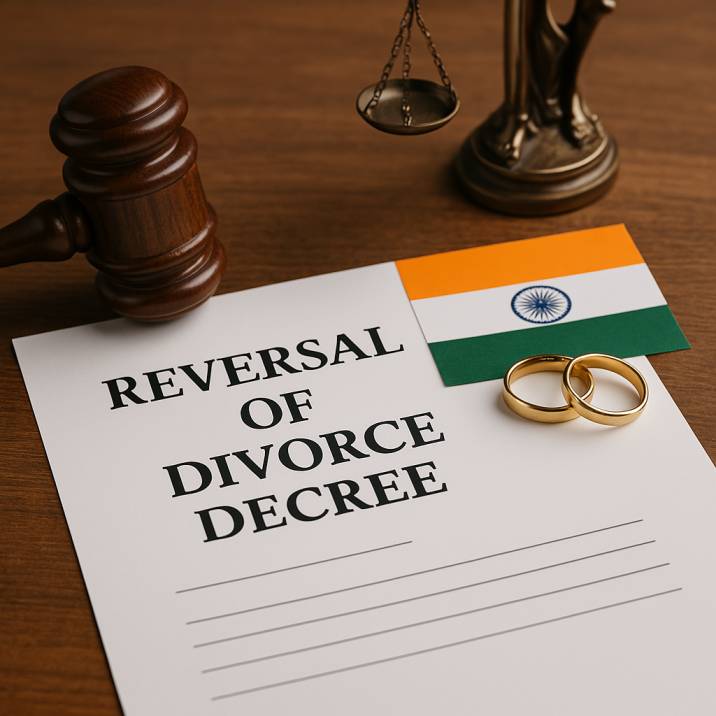There are cases where, after a significant period of time, a couple may deeply reflect and feel the urge to restore their marriage, especially when unforeseen changes or emotional discoveries surface long after the initial breakup. That’s why it’s important to know: Can a divorce decree be reversed under Indian Law?
In our years of navigating the complexities of family matters, I’ve witnessed how the divorce process, though often led by emotional strain and tough decisions, doesn’t always bring closure. The original agreement or settlement—a product of mutual consent and concordance between spouses—may later feel premature or out of sync with evolving realities.
Under Indian Law, the reversal of a divorce decree isn’t impossible, though it’s highly nuanced. If the marital terms were based on certain circumstantial grounds, and both parties are willing, the decree can sometimes be modified or even reconsidered—but this requires a fresh legal lens and often starts with both individuals admitting there may be regret.
It’s not just about paperwork; it’s about recognizing that human emotions don’t always follow legal timelines, and sometimes the heart chooses to rewrite its own decree, even if it has already been reversed once on record.
Mutual Consent Divorce and the Possibility of Reversal
From my experience working with couples navigating emotional crossroads, the possibility of a reversal in a mutual consent divorce—especially under Section 13B of the Hindu Marriage Act—depends heavily on both the timing and the conditions surrounding the case.
If the petition is still pending and the decree hasn’t been finalized or passed by the court, both parties can reconcile, withdraw the petition, and move forward without legal consequences. But once the decree is issued, a revocation becomes extremely difficult.
In rare occurrence, one party may approach the court and seek to annul the divorce, usually by proving they were coerced or acted under duress during the signing process. To prove such a claim, the court expects compelling evidence, and this path is not only complex but also emotionally taxing.
The Act does not make room for emotional indecision—so unless very specific circumstances exist, like force or manipulation, the reversal remains more a legal exception than a rule.
Contested Divorce and Appeal
In a contested divorce, the emotional and legal complexities run deeper, especially when one party has sought separation based on specific grounds like cruelty, adultery, or desertion, and the other disagrees with the decision.
I’ve seen cases where the family court’s verdict was challenged in an appellate setup, often with one party appealing the decree by choosing to file an appeal in the High Court. Under Section 19 of the Family Courts Act, 1984, this process must be initiated within 90 days from the date the decree was passed.
The grounds for appeal can include error in law, misinterpretation of fact, or even new evidence that might significantly alter the outcome. When the appeal proves successful, the High Court has the authority to set aside or modify the original ruling. Each such journey requires clarity, patience, and a deep understanding of both legal procedure and human emotion.
Setting Aside a Divorce Decree
Under certain cases, a divorce decree may be set aside if legal grounds under Section 13 of the Civil Procedure Code (CPC) are met. The court reviews whether the judgment contains any mistake or irregularity, such as fraud, misrepresentation, or coercion, which could have unfairly influenced the proceedings.
If a party was unaware, not notified, or unrepresented due to ill-health or non-appearance, they may file an application to challenge the decree. The process requires meeting strict legal formalities, with sufficient evidence to support the claim. The court will review the conditions and determine whether the divorce was obtained unfairly, ensuring that the procedure adheres to the Code and justice is served.
PETITION FOR REVERSAL OF DECREE OF SEPARATION
(Section 24)
In the (High) Court of: ______________________
To the Hon’ble Mr. Justice: _______________ or To the Judge of: _______________
The ____________ day of _______, 19
The petition of A.B., of ______________________
Sheweth,
- That your petitioner was on the ____________ day of , lawfully married to ****.
- That on the ____________ day of , this Hon’ble Court, at the petition of ****, pronounced a decree affecting the petitioner to the effect following, to wit: (Here set out the decree)
- That such decree was obtained in the absence of your petitioner, who was then residing at ____________. (State facts tending to show that the petitioner did not know of the proceedings; and, further, that had he known, he might have offered a sufficient defense.) or That there was reasonable ground for your petitioner leaving his said wife, for that his said wife ____________. (Here state any legal grounds justifying the petitioner’s separation from his wife.)
Your petitioner, therefore, prays that this Hon’ble Court will reverse the said decree.
(Signed) A.B.
Form of Verification: See No. 1

